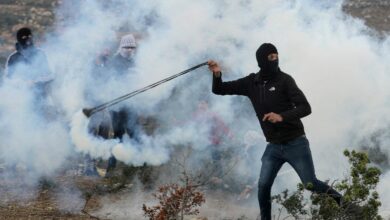Residents of Manshiyet Nasser, whose homes lie in the shadow of Cairo’s Moqattam district, are facing a double threat–the danger of rock-slides crushing their dwellings and the possibility that the government will resettle them in cramped apartments far from their places of work.
In order to avoid a major rock-slide–which could kill hundreds of people in this densely populated area of garbage collectors and craftsmen–the government, according to locals, began one month ago to evict those living in buildings close to the mountain, destroy the buildings and relocate the residents. The government wants to avoid a repetition of the 2008 rock-slide in nearby Duweiqa that killed119 people.
The evictions are being carried out without warning, say neighborhood residents. “I live on top of the cliff in Moqattam and all the buildings below mine have been emptied and destroyed,” explains 58-year-old Ferial. “None of my neighbors have been given eviction notices,” she adds.
Magda Gad, director of the Association for the Protection of the Environment (APE) in Moqattam, is more nuanced, explaining that, “People knew that evictions were going to happen at some point, even if they didn’t know the exact day.”
Soheir, a 30-year-old Moqattam resident, noticed photographers taking pictures of the area one month ago. “I immediately felt suspicious and asked them who they were and what they were doing, and I soon discovered they had been sent by the provincial authorities,” she says. Her suspicions aroused, she went to a local monastery to ask Moqattam’s most influential priest, Father Samaan, for advice. She recalls that the priest told her and her neighbors that "we had to stay in our homes, even if the government made our homes collapse on us.”
Fifteen buildings in the area have been evacuated and destroyed within the past two weeks, and Soheir dreads the moment when “they come to tear my house down.”
Losing their homes is not the women’s only concern–they also fear the government will relocate their families to apartments in remote parts of Cairo.
“I’ve been offered an apartment in Nasr City’s 10th district,” explains Soheir, visibly distressed. “But this means I will lose my job. And without a job, how am I supposed to support my family?” She also worries that the government will give her no more than a temporary residence with a two-year lease. “We have no guarantee that we’re going to be able to stay in this new apartment for the long term,” she says.
Typically, the buildings in Manshiyet Nasser are made up of two to four floors, each building accommodating a single extended family. What the government is offering residents is the relocation of each extended family into one apartment, which, in Soheir’s case, would mean cramming 22 people into a single flat.
The nearest area designed to accommodate endangered residents is the Suzanne Mubarak District, situated in Duweiqa, an area of Manshiyet Nasser and the site of the 2008 rock-slide. Unfortunately, accommodations there are almost full, with more than 4,000 families having been relocated there as of the end of 2009.
What’s more, alternative housing options offered by the governorate do not reflect residents’ incomes. “They asked me to choose between Helwan, Medinat Badr or Ha’it Aacher,” says Feriel, adding that, “I would prefer to die in my house than move to any of these far-away neighbourhoods, where there is no job, no transportation and no school.”
While the government is putting so much effort into evicting residents and demolishing homes, it has yet to launch an initiative aimed at removing the most dangerous rocks from the nearby hill, local residents say. Instead, Father Samaan has begun removing rocks near the monastery in an effort to safeguard the homes below.
Workers wearing bright red helmets, their faces covered with a thin layer of dust, have been removing pieces of the Moqattam hill for the past four days. The man in charge of monastery security explains that “the buildings down the hill are empty during the day when work is being done on the cliff; residents only come back to their homes at night.”
In the garbage-filled backyard of a seemingly abandoned building down the cliff, a pair of goats feeds on waste. Atef, a Manshiyet Nasser resident, stresses that “Abouna Samaan promised residents of the area below the monastery that they would keep their homes.”
Suzy Greiss, APE president and member of parliament, seems concerned by Father Samaan’s unilateral move. “He took responsibility for removing the rocks along the monastery without approval from the government,” she explains. “I don’t know if the government will take steps to remove rocks from Moqattam,” she continues, “but I do know that the government considers the work its responsibility and no one else’s.”




